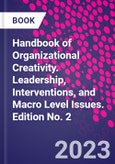Handbook of Organizational Creativity: Leadership, Interventions, and Macro Level Issues, Second Edition covers creativity from many perspectives in two unique volumes, including artificial Intelligence work, creativity within specific applied domains (e.g., engineering, science, therapy), and coverage of leadership. The book includes individual, team and organizational level factors and includes organizational interventions to facilitate creativity (such as training). Chapters focus on creative abilities and creative problem-solving processes, along with individual differences such as motivation, affect and personality. New chapters include the neuroscience of creativity, creativity and meaning, morality/ethicality and creativity, and creative self-beliefs.
Sections on group level phenomena examine team cognition, team social processes, team diversity, social networks, and multi-team systems and creativity. Final coverages includes different types and approaches to leadership, such as transformational leadership, ambidextrous leadership leader-follower relations, and more.
Please Note: This is an On Demand product, delivery may take up to 11 working days after payment has been received.
Table of Contents
Part I Leadership 1. Creativity in Organizations Macro Perspectives: Leadership, Interventions, and Applications Sam Hunter, Alexis L. d'Amato, Averie E. Linnell, and Roni Reiter-Palmon 2. Transformational Leadership and Creativity Herman H. M. Tse, Neal M. Ashkanasy, and Sabreen Kaur 3. Creative and Leader Identities in Conflict: Reconciling the Artist and the Leader Within Olga Epitropaki, Charalampos Mainemelis, and Ronit Kark 4. Enable to Innovate: A Review of the influence of Empowering Leadership on Follower Creativity and Innovation Yuntao Dong and Mingyue Tang 5. Ambidextrous Leadership: A Review of Theoretical Developments and Empirical Evidence Kathrin Rosing and Hannes Zacher 6. Shared Leadership Arrangements for Creativity and Innovation Tin L. Nguyen and Sam Hunter 7. CIP Leadership Theory and Creativity: The Benefits of Aligning Leader Cognition with Context Logan L. Watts, Sampoorna Nandi, and Rylee M. Linhardt Part II Organizational Level 8. Creativity and Momentum for Change Cameron Ford 9. Cross-Cultural Creativity in Organizations Ana Camargo, Wendy Ross, and Vlad Glaveanu 10. Achieving Implementation: Putting Creative Ideas to Work Lily Blocker 11. Creativity in the Gig Economy: Opportunities for Creativity Researchers in the New World of Work Melissa G. Keith and Isabelle Ponce-Pore 12. A Sociocognitive Perspective of Constraints and Creativity Kelsey E. Medeiros, Adam Damadzic, and Catrinel Tromp Part III Interventions 13. Rewards and Creativity Muhammad Abdur Rahman Malik and Fariha Zahid 14. Training and Development Alexander S. McKay and Roni Reiter-Palmon 15. Assessment and Selection for Creative Performance Tamara L. Friedrich and Jennifer A. Griffith 16. Too Many Bosses, Too Many Teams: Overcoming the Challenges of Team Innovation in Matrix Organizations Benjamin G. Wigert and Robert I. Sutton 17. Organizational Development Min Basadur, Tim Basadur, and Goran Calic 18. Design Thinking as an Organizational Intervention for Innovation Scarlett R. Miller 19. Promises and Realities of Artificial Creativity Kelsey E. Medeiros, Rebecca L. Marrone, Srecko Joksimovic, David H. Cropley, and George Siemens 20. Job Design and Creativity: Lessons Learnt and New Schools of Thought Kerri L. Unsworth, Anna Viragos, and Lynda Jiwen Song Part IV Fields 21. Marketing Creativity Eric Shiu 22. Preparing for the Demands of the Future of Work: Engineering Organizations, Creativity, and Innovation David H. Cropley and Arthur J. Cropley 23. Building Dream STEAM Teams: Harnessing Interdisciplinarity to Enrich Research Jen Katz-Buonincontro 24. Creativity in Health Care Victorial Kennel and Bethany R. Lowndes 25. Positive Psychodrama in Organizations Hod Orkibi 26. Creativity in Entrepreneurship: Dancing Between Nothing and Structure Sylvia Hubner-Benz and Michael Frese 27. Teaching and Learning for Creativity in Science and Mathematics Florence Gabriel, Rebecca Marrone, and Kim van Broekhoven Part V Conclusion 28. The Future of Organizational Creativity Research: What's There, What's Missing Michael D. Mumford, Samantha England, Tanner R. Newbold, and Mark W. Fichtel








